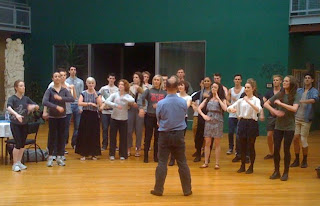What don't I know?
In
2011, I received a Fulbright “Specialist” grant as a part of their program that
places professionals with proven excellence in their field for projects that
are between six weeks and four months. That grant was used in support of a
licensing project for me to stage Paul Taylor’s “Company B” on the graduating
students at the New Zealand School of Dance in Wellington. This also happened
to be one of the few opportunities for me to connect in person with Nigel, whom
I mentioned previously as having just lost a very short battle with cancer. I
came to view the Fulbright grants as supporting global opportunities to build
an international network for future projects, and deepening established relationships
with institutions and individuals.
For India, I will need to register with the
local authorities once I have an address in my primary location which will be
Mumbai. Under Fulbright’s guidelines, they will house me for my first two weeks
and provide assistance to find and move into a local residence once I am in country. As a freelance
professional, I am loathe to leave these types of arrangements to the last
minute. Once again, I am assuring myself with the thought that I am not the
first person to go through this process, and that I can trust in my own abilities to navigate the unexpected!
In 1990 I was performing in Bali, and went to
visit Lake Bratan. I gained a pretty large audience of locals when I expressed
interest in trying to paddle a dugout canoe for the very first time. Sometimes
the unexpected is the treat!
 |
2011 – NZSD students perform their school “haka” for me in a
very moving farewell at the end of my visit (photo by Nigel Boyes).
|
 |
2011 – NZSD students performing Paul Taylor’s “Company B”.
|
What I did not know about Fulbright, at first, was the
manner in which it administers to the considerable number of grantees, in a
myriad number of countries across a cornucopia of disciplines. In hindsight, I
have to admire the ability of Fulbright to manage all of the above. For me the
biggest adjustment in working with Fulbright was that even though I may have a
project in place a year or more in advance, Fulbright only approves projects
for the upcoming academic year in the early months of the calendar year. In
short, my projects that have been contingent on funding from Fulbright were
prepared with a “leap of faith”, trusting
that all would work out.
Once the grant was approved, for me, it felt like a short
few months in which to get through the various bureaucracies for work permits,
visas, travel arrangements, etc. And this is where I have needed to trust that things do work out. My
paperwork for New Zealand was considerably different than for India, but in
both cases the systems were not particularly user-friendly or intuitive.
 |
| 1990 - me paddling a dugout canoe on Lake Bratan, Bali, Indonesia |
For many years I was
a wilderness kayak guide and as a trainee instructor/guide I learned three
tenets for handling my responsibilities.
1) Be prepared! 2) Shit happens! 3) Do
something nice for yourself! (Actually #3 was told to me as “Bring beer!” But I
can’t drink, so I go with the spirit of the idea)
As an outdoor water sport guide, every outing is contingent
on Mother Nature’s beneficence and rules governing things like tides, currents,
topography, meteorology, etc. No matter how prepared one might think you are
for ALL eventualities, something often happens that you could not have
predicted, so you learn to accept the unpredictable… And remember to treat
yourself at the end of the day when you are re-counting your adventures!
I have found this approach very helpful, particularly when I
feel that there is much that is beyond my control until they actually happen,
as with this trip to India.



Comments
Post a Comment